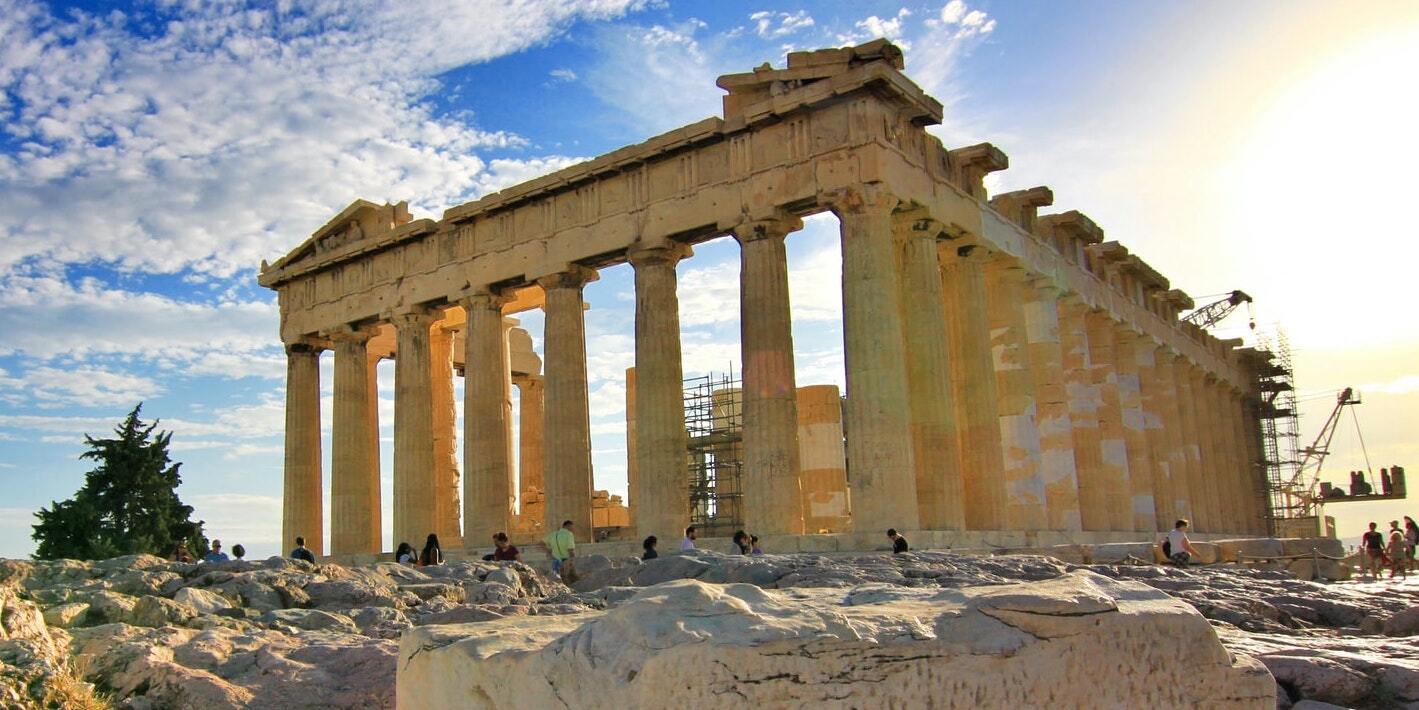Situated in the south of Europe, Greece borders both the Ionian sea and the Aegean sea. Its neighbours include Albania, North Macedonia, Bulgaria, and Turkey. The history, especially in ancient times, is as rich as it is fascinating, both for historians and genealogists. With around 3,000 islands, the huge peninsula and archipelago in the south are a stark contrast to the forests, lakes, and highlands found inside the mainland.
Can you really find out if you have Greek ancestry?
Yes, yes, a thousand times, yes! Thanks to the progress made in ancestry DNA testing, we are able to offer a service that gives you marvellous insights into your ancestral past. You can see where your ancestors came from, where they went, and whom they mixed with.
Before you take that swab though, you might want to know...
What does ‘Greek’ mean and what is Hellas?
- This can be a little complicated so we’ll try to break it down:
- Greece is the English word for the country
- In the Greek language, the country is referred to as Hellas (Ελλάς) or Hellada (Ελλάδα)
- Greek refers to both the language, the nationality, and the culture, though Greek can be replaced by the term ‘Hellenic’
- Hellenes should also be used in place of Greek when referring to the ethnic group, and this is the term that describes the people who lived in ancient Greece, as well as the ancient Greek colonies, which includes most of the Eastern Mediterranean
- Officially, Greece’s real name is the Hellenic Republic, or Helliniki Dimokratia (Ελληνική Δημοκρατία)
- Where does Hellen come from? Well, Hellen was an important character in Greek mythology…
- The name Greece comes from Latin, as the Romans referred to the empire as Graecia, and this name seems to have stuck 2,000 years later
- There’s another reason for the rebranding. As Christianity gained popularity in Europe, to be Hellenic became, by association, something heretic. Those who believed in the mythical gods of Olympus slowly became the minority
- During the height of ancient Greece, they felt superior philosophically, intellectually, and culturally, which made them a bit pretentious. They joked that other cultures and their languages sounded like ‘bar bar bar’ when they spoke, and thus the term barbarian was born!

Greece’s Historical Migrations & Ancestry: Fact File
By the Bronze Age, around 5,300 years ago, Greek was the lingua franca among civilisations developing on the shores of the Mediterranean and the Black Sea. This, however, was a simple hunter-gatherer culture, and a more civilised or advanced culture wouldn’t arrive until around 1,750BC, known today as the Mycanaean Greeks. Around 2,200 BC, almost 500 years before, the Minoan culture began on the island of Crete, with many claiming this to be the original Greek civilization.
There are several significant migration points in history that come after this. With the first being the expansion of the empire around the Mediterranean, which saw Greek lineage form predominantly in what is now Western Turkey, Northern Egypt, Southern Italy, Southern Spain, Southern France, all of the Black sea, and in places such as Georgia and Ukraine. This expansion began around 1200 BC. By 323 BC, the Greek Empire was much larger and was led by Alexander the Great, who sought to conquer lands as far as India. Alexander died whilst trying to conquer Persia and Arabia, hoping to create a superstate loyal only to him.
If you’re particularly interested in this period, this article will blow your mind. You can learn more about how the Greek islands became settled during the Iron Age here, which may be of interest if you believe your ancestors to have come from one specific island.
In the 7th century AD, from about 610 onwards, Greece’s Byzantine leaders came under attack from the Persians, Lombards, Slavs, Avars, Arabs, and Bulgars. They lost and won territory over time and this, as well as the region being ruled from Constantinople in Turkey, saw a lot of new DNA entering the Greek sphere.
Greece changed hands many times in history, but one of the most significant times was in the 13th century when Greece went from Latin rule, back to Byzantine rule. Unfortunately, this wasn’t to last, as in 1453 the Ottomans captured the capital in what is now known as the Fall of Constantinople. By 1500, the Ottomans had taken the lot, even the islands that were being run by the Venetians and Genoese. This is, except for the Ionian islands, a Greek stronghold that is seen by many as the birthplace of the modern-day Greek nation. When the Ottomans first arrived and took control of Greece, many Greeks fled to safer horizons, namely Western Europe, the mountains to the north of Greece, and to many of the small islands.
Greece achieved independence in 1829, and at that point, many ethnic Greeks decided to return. Many, however, did not, and that is why Greece has such a rich and interesting diaspora…
How is the Diaspora?
Here are some facts about Greek populations outside of Greece:
- The US boasts over 3 million ethnic Greeks
- Australia has approximately 700,000
- Albania (their neighbour) has around 300,000, more than 10% of the population!
- Cyprus, which is a Greek-speaking country, has around 150,000 ethnic Greeks
- Italy, Germany, the UK, Canada, Ukraine, Russia, and Mexico all boast at least 25,000 Greeks
- The most surprising Greek diasporas might be the 4,500 Greeks in Uzbekistan, the 4,700 in Kazakhstan, the 1,200 in Cameroon, or the 2,000 in Uruguay
- 15 people in Uganda are reported to be of Greek heritage, making it the lowest reported number in the world (greater than 0)
Greek migrations in the last couple of centuries
It’s most likely, if you’re looking into your ancestry, that you’re more concerned with the recent past, covering the last 200 years, or roughly 8 generations.
As we’ve said, in the 1830s, Greeks began returning after centuries of trouble. Unfortunately, by the end of the 19th century, more than one-sixth of all Greeks had emigrated to the US and Egypt. The government actually encouraged the spread of Hellenism and the influx of remittances.
After WW2, another wave of migration followed. With demand for oil increasing in the modern world, many Greeks moved to work in the oil industry, in the US, Canada, Australia, Western Europe, and Scandinavia. Unfortunately, the oil crises of 1973 and 1980 forced many countries to impose stricter immigration laws, which forced a return to Greece for many ethnic Greeks, even those who had never lived there. Despite all of this upheaval, it was actually Germany that retained most of the Greek influx, with over 600,000 moving there between 1955 and 1973. This is a surprising statistic considering only 44,000 of today’s Germans consider themselves of Greek ancestry.

How can you find out more about your Greek ancestry?
Unlike most countries, where records were kept fairly well and people can search the archives, Greeks are active citizen genealogists who connect through Facebook groups to share their findings! Here are the three most popular:
1) Hellenic Genealogy Group - 30k+ members
2) Greek Ancestry & History - 12k+ members
3) Hellenic Genealogy Resources - 4k+ members
Beyond Facebook, the best places to look are:
- Visko (requires Greek language skills)
- Greek Records (also requires Greek language skills)
What can your Greek name tell you?
Greek names are long and often hard to pronounce. A point of frustration for non-Greeks, but a wealth of information regardless! In these long names, there are clues and details to be found.
- Many Greek surnames end in ‘ou’, which means of, with the preceding name usually being that of the father. Christoforou means ‘son of Christofor’
- All women keep their birth surname at marriage, meaning it’s easier to find information about maternal ancestries
- Many surnames become too long and the family decide to permanently abbreviate them
- Other surnames come from Orthodox Christian Saints, which may connect to a name day or saints day
- Search for your name here and see if its meaning helps your ancestral research
Why is this useful? Well, imagine your name is Frangopoulos, meaning ‘descendent of the French’. Suddenly your research is going to take a new turn. Another common name is Leventis, meaning ‘Person from the East’. Can you guess what Rousopoulos might mean?
What can you learn from using a Living DNA kit?
We’ve given you some overlying information about Greek ancestry, but the real data comes from science and DNA exploration. By using our swab kit, you can find out:
- Your recent ancestry from the last 500 years
- Sub-regional ancestry and migrations from further back
- Extended ancestry that looks tens of thousands of years into the past
- Whether you have any relatives in our data bank!
Thank you for reading. Oh, and Rousopoulos means ‘Descendant of Russia’
